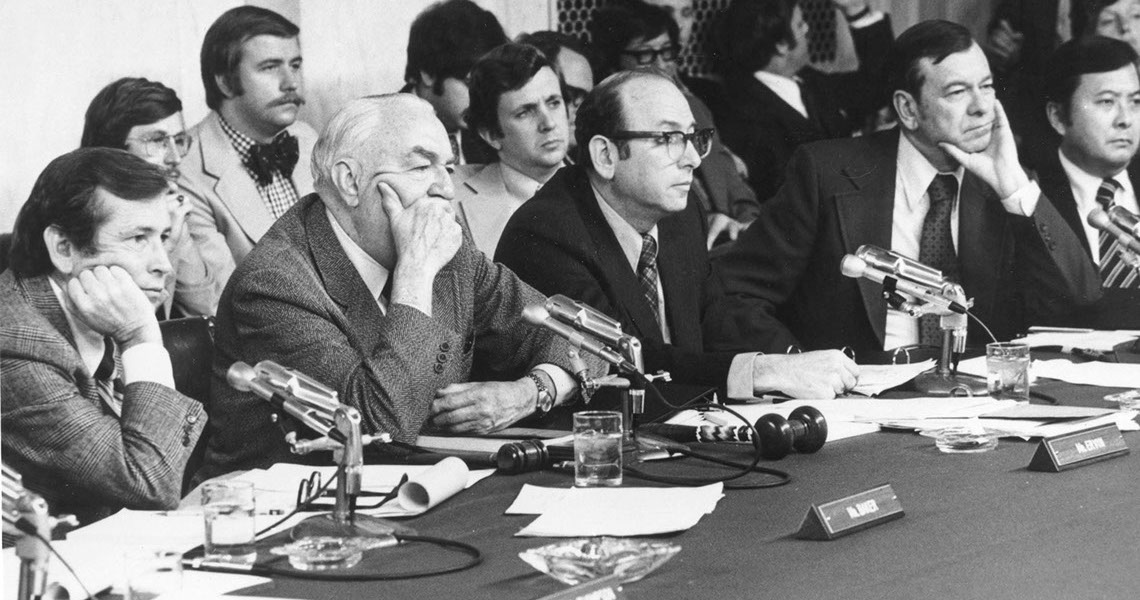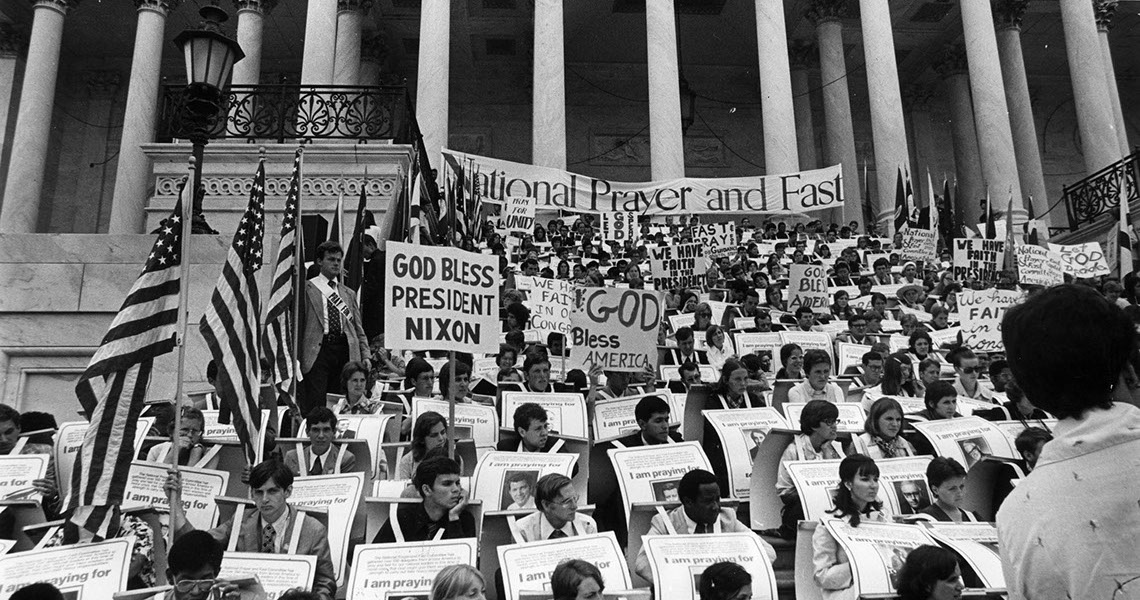A corporate blueprint to dominate democracy
1970s
“If the free enterprise system - as they define it - is going to survive, they're going to have to fund lobbyists, think tanks and writers who are going to defend it”
- Michael Kazin
Overview
1
THE POWELL MEMO & THE RISE OF THE CORPORATE LOBBY
A 1971 memo penned for the head of the US Chamber of Commerce, by lawyer Lewis Powell, calls for American businesses to defend their interests in the face of liberal concessions, through the creation of lobby groups, media and think tanks.
1
The Powell memo & the rise of the corporate lobby
July 29, 1974: The Judiciary Committee Impeachment Panel gathered to hear evidence in the Watergate affair, eventually leading to the impeachment of President Nixon. From left to right, Donohue, Rodino and Hutchinson. (Photo by Keystone/Getty Images)
“People didn't trust the federal government anymore to do the right thing”
- Michael Kazin
With every gain made
With every gain made by marginalised sections of the American people, the American establishment – both government and business – sought redress to keep the status quo, and keep the people in their place.
In a 1971 memo penned for the head of the US Chamber of Commerce, by lawyer Lewis Powell, the business elite moved to take back some of the ground ceded to the people’s interests.
JONATHAN WEILER
JULIET SCHOR
MICHAEL KAZIN
“Lewis Powell wrote a memo in which he essentially said, US business is losing a war for the soul of America. We are losing the campuses, we are losing the younger generations, they no longer hold business in esteem as has always historically been the case in the United States, they now see business as a force for evil in American society, they want to rein it in.”
Watch
“So business began organising, and that union busting was one of the things that they attempted to do. They also began a long what we might think of as a propaganda war in which they tried to convince people that giving more to the wealthy and giving more to business would be good for everybody.”
Watch
“You get think tanks funded by people like the Koch brothers, like the CATO Foundation, people who believe that if the free enterprise system as they define it is going to survive, they're going to have to fund lobbyists, think tanks, writers who are going to defend it.”
Watch
The Lewis Powell Memo: A Corporate Blueprint to Dominate Democracy
•
•
•
Lewis Powell's eight-page memo, titled ‘Attack on American Free Enterprise System,’ was a call for American businesses to defend their corporate interests against criticisms of capitalism emanating “from the college campus, the pulpit, the media, the intellectual and literary journals”.
Powell recommended a number of strategies, including building a group of scholars-on-call to defend the system; monitoring and critiquing the media; and building legal organisations that could fight back in the courts.
An important legacy of his vision was the establishment of think tanks the Cato Institute, the American Enterprise Institute and Heritage foundation to provide legitimacy for the conservative agenda.
Lewis Powell’s corporate manifesto hit a responsive chord. In 1971, there were only 176 companies in Washington DC. A decade later, in 1980, there are 2,445 companies, 9,000 lobbyists and 60,000 trade association employees.
Richard Nixon would reward Lewis Powell with a seat in an increasingly conservative US Supreme Court.
January 11, 1972: The two new Associate Justices of the US Supreme Court after being sworn in, William Rehnquist (left) and Associate Justice Lewis F Powell. (Photo by Keystone/Getty Images)
But when the president was found to have lied about a break-in at the Democratic Party headquarters in Washington DC, no court, and no friends could save Nixon’s presidency from ending in disgrace.
What was the Watergate scandal?
•
•
•
•
Watergate was a major political scandal that occurred in the US in the 1970s and brought down the Nixon presidency.
After a break-in at the Democratic National Committee (DNC) headquarters at the Watergate office complex in Washington, DC, in 1972, the Nixon administration tried to cover up its involvement, leading to a constitutional crisis.
Multiple abuses of power by the Nixon administration were uncovered, and an impeachment process led to Nixon’s resignation in 1974.
Gerald Ford assumed the presidency, and subsequently pardoned Nixon of all charges relating to the Watergate scandal.



American politicians listening to the testimony of James McCord, one of the Watergate burglers, during the Watergate hearings. (Photo by Gene Forte/Getty Images)
29th July 1974: A prayer vigil in support of Republican President Richard Nixon during the Watergate crisis. (Photo by Keystone/Getty Images)
August 8, 1974: American president Richard Nixon (1913 - 1994) announces his resignation on national television, following the Watergate scandal. (Photo by Pierre Manevy/Express/Getty Images)
3 - 3
<
>
“I have fought for what I believe in. Sometimes I have succeeded, and sometimes I have failed.”
- Richard Nixon
Archive: Richard Nixon's speech
His time in office, and the scandal-scarred years that followed, would widen the rifts between the splintered American people and established American authority.
Two hundred years after its birth, the United States was still struggling to come to terms with who and what it wanted to be.
JONATHAN WEILER
MICHAEL KAZIN
“In the 1970s I think that was up for grabs, that sort of contest if you will between the forces demanding accountability and the forces determined to sort of put that genie back in the bottle.”
Watch
“People didn't trust the federal government anymore to do the right thing, which they had up until late 1960's even early 1970's. And that's very important because liberals in the United States depend on people having faith that the federal government can solve some problems and if the Americans don't have that faith that helps conservatives.”
Watch
The ‘liberal’ administration of President Jimmy Carter, had appointed a record number of women and minority groups to government, while struggling to deal with economic downturns and failures of foreign policy.
A new era of conservatism
Next: 1980s

